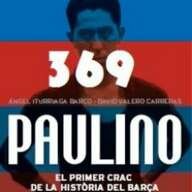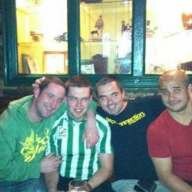 history | 2015-05-02
history | 2015-05-02
The Great 1984/85 La Liga Season - Part One
Among Barcelona's greatest La Liga victories
Last March marked 30 years of a historic event for everyone associated with FC Barcelona, namely, the title-winning 1984/85 season. It probably isn’t the most talked-about victory among younger generations, but, for me, it was important because, among other things, it was my first La Liga, or rather, it was the first time I saw Barça winning an important title, beyond the classic Spanish Cups and Cup Winners Cups.
FC Barcelona had gone 11 years without winning Spain’s top prize, the last title coming in 1973/74 with Johan Cruyff leading the team and Francisco Franco at the top of the dictatorship which governed the country. For me personally, all of that stuff about Cruyff’s La Liga and the 0-5 at the Bernabéu seemed prehistoric, and, despite all of the talk about him from older fans, I never saw the Flying Dutchman play.
The 1984/85 La Liga was the tenth in the club’s history and was supposed to have put an end to a long trophy drought, although, sadly, we would later discover that this title would be nothing more than a tiny oasis on this painstaking journey, because as soon as it was won, we would find ourselves stuck in the mud once again for six long years.
I do not think I’m betraying the truth by claiming that that season presented many uncertainties, given that it was the first year since Maradona’s departure and the project was going to be led by a manager with whom the general public was unfamiliar. It was Terry Venables, an Englishman with a relatively poor track record (at least in comparison to his predecessors, Udo Lattek and César Luis Menotti) who had established himself as a footballer at a club which is not particularly popular around these parts: Chelsea.
Nobody could have imagined that, 20 years later, this London-based club would become one of our toughest and most persistent rivals in European competition. When Venables was signed by Barça, he was managing Queens Park Rangers, a team which sounded exotic to the average culé of the time.
And, as if this was not enough, the rookie English manager had rejected Atlético de Madrid’s star player, Hugo Sánchez, because he preferred a lanky, blonde Scotsman named Steve Archibald, who was also unknown to the rest of us. It is worth adding that Diego Armando Maradona had left the club that summer for Napoli.
The team that began that season was basically a mix of three groups of players: The veterans: Alexanko, Carrasco, Esteban, Gerardo, Migueli, Manolo, Moratalla, Schuster, Sánchez, Urruti and Victor. Those who remained from the barrage of signings from the summer of 1982: “Periko” Alonso, Julio Alberto, Marcos “Pichi” Alonso and Urbano. And a few exciting youngsters from the youth team who had recently consolidated their places in the first team: Clos, Rojo and Calderé.
Added to this bunch were the aforementioned Scotsman, Archibald, the substitute goalkeeper, Amador (at a time when sub ‘keepers gathered cobwebs on the bench) and Salva, a promising sweeper about whom everyone spoke very highly but who, for one reason or another, very few saw play consistently.
The four previous seasons had been marked by the unusual fact that the La Liga title had been monopolized by Basque teams, the modest Real Sociedad (from San Sebastián) had won the first two editions (1980/81 and 1981/82), while the historic Athletic Club de Bilbao would take the following two league titles to the Basque capital (1982/83 and 1983/84).
Over those four seasons destiny had been very cruel to us culés, because a series of unfortunate and, let’s face it, unusual events took their toll on the blaugrana club and led to them failing time and again.
At the end of the 1980/81 season, Quini, the team’s goal scoring center forward, was kidnapped when FC Barcelona was in the running for the title and he was leading the race for the Pichichi. The uncertainty and anxiety which surrounded the players during the month that Quini was in the hands of his captors plunged the team into a spiral of bad results which ended with them losing the La Liga title. While the Asturian goalscorer was absent from the starting XI, the team won just one point from a possible eight.
The blow was an even harder one the next season. With six matches remaining, FC Barcelona held a comfortable five-point lead (plus the goal average) over second-placed Real Sociedad. It seemed impossible that the team from San Sebastian would make up that six-point gap in such a short space of time, but, inexplicably, the blaugrana switched off and won just two of a possible 12 points, which put the title on a plate for the Basque team that, in this way, won the second La Liga title in its history.
Things started to take a turn for the worse one evening in March, when a Valencia side that was in terrible form secured a convincing 3-0 win over Barça. It should be noted that, three months into the season, the German star Bernd Schuster got injured against Athletic de Bilbao, a victim of a rash tackle from Goicoechea, the Basque team’s center half. The German would not recover for another year, a situation which also, undoubtedly, contributed to the blaugrana losing the title.
In the 1982/83 season, the signing of Maradona, as well as the arrival of the outstanding player in Spanish football, established the Catalan club as undisputed favorites to win La Liga but bad luck conspired to ensure that, once again, the final triumph would elude us. On this occasion, it was a case of hepatitis which left the Argentine superstar out of action for three long months. Even still, the team fought gallantly until the final hurdle, but it was all in vain.
Finally, the last chapter of the Basque quadruple (the 1983/84 La Liga) was marked by a brutal tackle from the Athletic de Bilbao defender, Goicoechea, which shattered Maradona’s ankle and left him out of action for over three months. Yes, the very same player who had put our German Ballon d’Or runner-up, Bernd Schuster, out of action.
It seemed like witchcraft but, once again, FC Barcelona saw how bad luck stood in their way to ensure their ultimate failure. Nonetheless, the blaugrana was in with a chance of winning the title up until the last day but, due to unexpected quirks in the calendar, Athletic was playing for the title in their last game against their compatriots, Real Sociedad. Naturally, the team in red and white stripes won.
Read the second part of this series: The Great 1984/85 La Liga Season - Part Two










